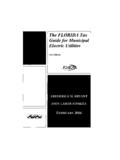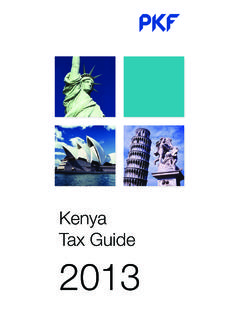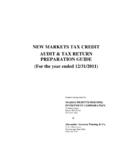Transcription of Hong Kong Tax Guide - Baker Tilly Hong Kong
1 hong kong Tax Guide 2017/18. hong kong Tax Guide 2017 / 18 1. Taxation in hong kong hong kong imposes three direct taxes for a year of assessment which ends on 31 March. The taxes are on profits, salaries and property. hong kong adopts a territorial concept of taxation, with taxes levied primarily on hong kong sourced profits and income on a current year basis, except for businesses which are assessed on profits of their accounting periods. Companies are taxed as separate entities. No group tax loss relief is available. Individuals carrying on business as sole proprietors or partners may elect for a Personal Assessment which will have the effect of amalgamating their varied income into a single assessment.
2 Double Taxation Relief hong kong has signed the following international double tax agreements: Agreements on taxation of international shipping profits: Denmark Singapore Germany Sri Lanka The Netherlands The United Kingdom Norway The United States of America Agreements on taxation of international airline profits: Bangladesh Israel Norway Belgium Jordan People's Public of China Canada Kenya The Republic of Korea Croatia Kuwait Russia Denmark Macao Singapore Ethiopia Mauritius Sri Lanka Finland Mexico Sweden Germany The Netherlands Switzerland Iceland New Zealand The United Kingdom hong kong Tax Guide 2017 / 18 2.
3 Comprehensive double tax treaties: Year of Assessment Country Effective Date 2004/05 Belgium 7 October 2004. 2006/07 Thailand 7 December 2005. 2007/08 People's Republic of China^ 8 December 2006. 2008/09 Luxembourg 20 January 2009. 2010/11 Vietnam 12 August 2009. Brunei 19 December 2010. 2011/12. United Kingdom 20 December 2010. Austria 1 January 2011. Ireland 10 February 2011. Hungry 23 February 2011. Liechtenstein 8 July 2011. 2012/13. Japan 14 August 2011. The Netherlands 24 October 2011. New Zealand 9 November 2011. France 1 December 2011. Czech Republic 24 January 2012. Indonesia 28 March 2012.
4 Spain 13 April 2012. Portugal 3 June 2012. 2013/14. Malta 18 July 2012. Switzerland 15 October 2012. Malaysia 28 December 2012. Austria (Second Protocol) 3 July 2013. Mexico 7 March 2013. Jersey 3 July 2013. Kuwait 24 July 2013. 2014/15. Canada 29 October 2013. Guernsey 5 December 2013. Qatar 5 December 2013. Vietnam (Protocol) 8 January 2015. Italy 10 August 2015. 2016/17. South Africa 20 October 2015. United Arab Emirates 10 December 2015. Russia 29 July 2016. 2017/18 Korea 27 September 2016. Romania 21 November 2016. (For income derived on or after 1 January 2017). ^ Revised double tax arrangement Awaiting Notification Country Signed Date Subject to completion Latvia 13 April 2016.
5 Of ratification Belarus 16 January 2017. procedures by both Pakistan 17 February 2017. governments hong kong Tax Guide 2017 / 18 3. Profits Tax Scope of charge Persons (including companies, individuals and partnerships) carrying on a business in hong kong are liable to profits tax only on profits derived from hong kong . Profits from sale of capital assets are specifically exempt from profits tax. Source of profits The territorial concept of taxation in hong kong recognises that a hong kong business may generate profits from different geographical sources. Only profits sourced in hong kong ( onshore profits ) may be subject to profits tax.
6 Profits sourced outside hong kong ( offshore profits ) are generally not taxable even though they are part of the profits of a hong kong business. However the distinction between onshore and offshore profits is often an issue disputable between taxpayers and the tax authority in hong kong , the Inland Revenue Department ( IRD ). As there are no comprehensive definitive legal rules in this area, courts in hong kong have given the following general case law guidelines over the years: Kinds of Profits Location of Source Profits from trading in goods effected Where sale and purchase contracts are affected Manufacturing profits Where manufacturing activities are conducted Service fees Where services are performed Interest from deposits or other simple Where the deposit or loan is first made available loan arrangements to the borrower Profits from sale of (or rental income Where the land and building situate from)
7 Land and building Therefore, if a hong kong company derives trading profits from sale and purchase transactions effected outside hong kong , it should have a strong case to claim that those profits are not subject to profits tax. Taxpayers intending to make a claim of offshore profits should anticipate the need to submit documentary evidence (such as trade documents) to the IRD. Despite the recent landmark decision of the Court of Final Appeal in the ING. Baring case, the IRD is expected to continue their practice to emphasize the totality of a taxpayer's business. If the IRD considers that important business activities have been done in hong kong , the IRD will not be easily convinced by a taxpayer's claim of offshore profits.
8 In ING Baring however, the highest court of hong kong clearly rejected such a totality of facts approach in preference to a narrower approach that focuses on the specific profit-producing operations . of a taxpayer. Taxpayers should consult their tax advisers when planning for any offshore claim. Capital gains or profits Profits from sale of capital assets (as opposed to trading assets) are specifically exempt from profits tax. However, there are no definitive legal rules that draw hong kong Tax Guide 2017 / 18 4. the distinction between capital and trading assets. Reference is usually made to the following Six Badges of Trades established by the English court in Leeming v Jones (1930) 15 TC 333: 1.
9 The subject matter of the transaction;. 2. The length of ownership;. 3. Whether there have been successive or frequent transactions of a similar nature;. 4. Whether supplementary activities have been performed to make the asset marketable or to attract purchasers;. 5. The reason for the disposal of the asset;. 6. The taxpayer's motive. In practice, while a taxpayer's motive is important, a short period of ownership would tend to indicate that an asset is a trading asset. Basis of assessment Tax is charged on the assessable profits for a year of assessment. The assessable profits for a business are calculated on the profits of the accounting year ending in the year of assessment.
10 Profits tax rates 2017 / 18. Corporations Unincorporated business 15%. Profits tax deductions Expenses incurred in the production of chargeable profits in any period are deductible from profits tax. Capital expenditure incurred in the purchase of rights to patent, industrial know-how, registered trademarks, copyrights and registered designs from unrelated parties, for use in hong kong , are fully tax deductible. 2017 / 18. Charitable donations Up to 35% of assessable profits Losses Tax losses may be carried forward indefinitely to be offset against future profits of the company. A change in shareholding may affect the utilisation of the losses if the sole and dominant purpose of the change is to utilise the tax losses.



